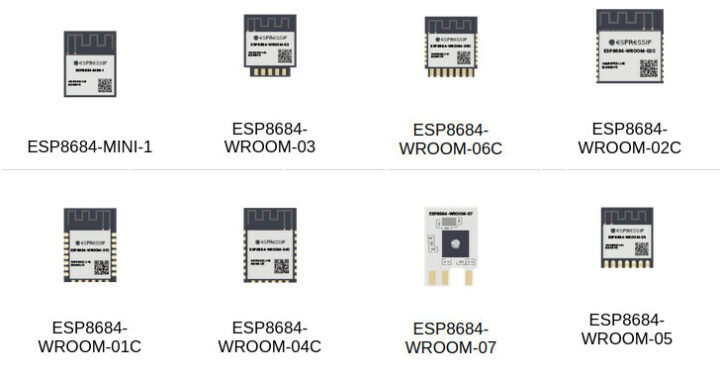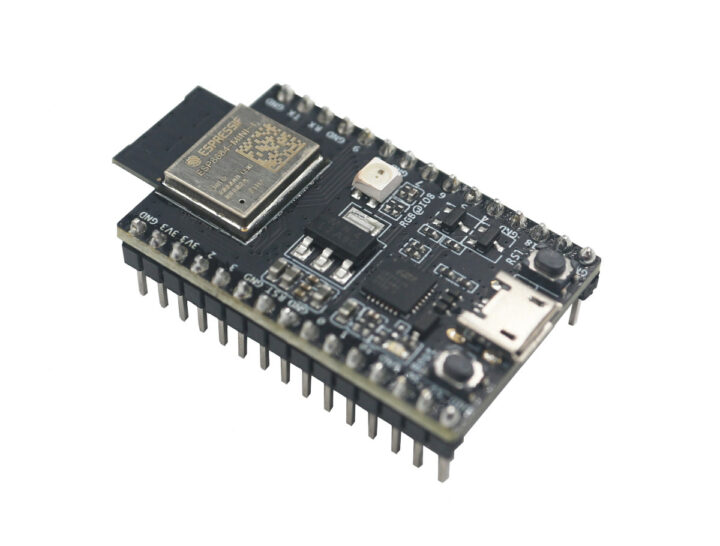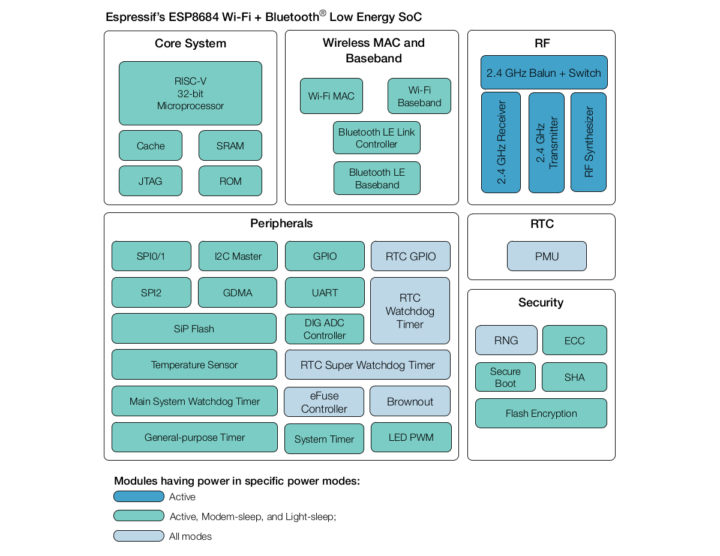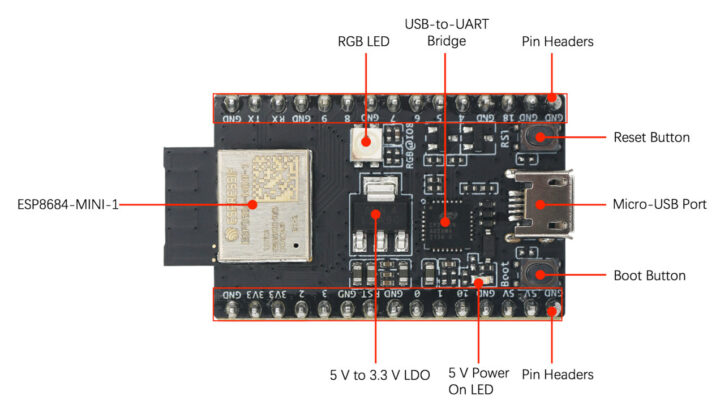Espressif Systems ESP8684 is a single-core RISC-V microcontroller with 2.4 GHz WiFi 4 and Bluetooth 5.0 LE (BLE) connectivity that also integrates 1, 2, or 4MB flash into a tiny 4x4mm QFN package.
The SoC is listed under the ESP32-C2 product family on the Espressif website and can be found in MINI and WROOM modules, as well as the ESP8684-DevKitM-1 development kit. All three parts, namely ESP8684H1, ESP8684H2, and ESP8684H4, are designed to work in the -40 to 105°C temperature range,
ESP8684 specifications:
- CPU – 32-bit RISC-V processor up to 120 MHz; 305.42 CoreMark; 2.55 CoreMark/MHz
- Memory – 272 KB SRAM (16 KB for cache)
- Storage – 576 KB ROM, 1 to 4MB flash (SiP)
- Wireless
- 802.11 b/g/n-compliant WiFi 4 1T1R
- Up to 72.2 Mbps link rate
- Support for 20 MHz bandwidth
- Station mode, SoftAP mode, Station + SoftAP mode
- Wi-Fi Multimedia (WMM)
- Antenna diversity
- Bluetooth 5 LE up to 20 dBm power, 2 Mbps data rate
- 802.11 b/g/n-compliant WiFi 4 1T1R
- Peripherals
- 14x programmable GPIOs
- 3x SPI, 2x UART, 1x I2C Master
- LED PWM controller with up to 6 channels
- General DMA controller (GDMA), with 1 transmit channel and 1 receive channel
- 12-bit SAR ADC, up to 5 channels
- Temperature sensor
- Timers – 54-bit general-purpose timer, 2x watchdog timers, 52-bit system timer
- Security
- Secure boot
- Flash encryption
- 1024-bit OTP, up to 256 bits
- Crypto accelerator for SHA, ECC
- Random Number Generator (RNG)
- Low Power Management – Power Management Unit with four power modes
- Package – QFN24 4x4mm
While the company calls the ESP8684 an “SoC”, it’s more like a SiP (system-in-package) with ESP32-C3 and SPI flash as explained on ESP32 forums:
ESP8684 has an ESP32-C2 silicon die packaged together with (some amount of) flash in a 4×4 mm QFN-28 package…
ESP32-C2 is a lower-end chip compared to ESP32-C3, with less RAM and peripherals… I can’t say yet whether ESP32-C2 will be marketed and sold only as part of ESP8684 package or separately as well.
There’s also an ESP8685 combining an ESP32-C3 die with a 2MB flash in a 4×4 mm QFN-28 package, but let’s focus on the “ESP32-C2” part in this post.

Espressif Systems (will) offer the chip in eight different modules:
- ESP8684-MINI-1 – 53 pins, 13.2×16.6×2.4 mm, PCB antenna
- ESP8684-WROOM-01C – 22 pins, 24×16×3.1 mm, PCB antenna
- ESP8684-WROOM-02C – 18 pins, 18x20x3.2 mm, PCB antenna
- ESP8684-WROOM-03 – 11 pins, 15×17.3×2.8 mm, PCB antenna
- ESP8684-WROOM-04C – 17 pins, 24×16×3.1 mm, PCB antenna
- ESP8684-WROOM-05 – 7 pins, 15×17.3×2.8 mm, PCB antenna
- ESP8684-WROOM-06C – 21 pins, 15.8×20.3×2.7 mm, PCB antenna
- ESP8684-WROOM-07 – 6 pins, 8.5×12.7×1.9 mm, PCB antenna
Note that all those modules are only offered with 2MB or 4MB SPI flash, except the ESP8684-MINI-1 that’s available with 1, 2, or 4MB flash. Right now we only have information in Chinese about the modules, but I suppose it will be provided in English very soon.
 There’s also the ESP8684-DevKitM-1 development board based on ESP8684-MINI-1 module with a micro USB port for power and programming, pin headers for I/Os, Reset and Boot buttons, and an RGB LED. A wiki in English provides detailed instructions to get started with the ESP-IDF framework or the ESP-AT software in case you’d want to use the board/module as a wireless coprocessor.
There’s also the ESP8684-DevKitM-1 development board based on ESP8684-MINI-1 module with a micro USB port for power and programming, pin headers for I/Os, Reset and Boot buttons, and an RGB LED. A wiki in English provides detailed instructions to get started with the ESP-IDF framework or the ESP-AT software in case you’d want to use the board/module as a wireless coprocessor.
At the time only the ESP8684-MINI-1-H4 or H2 and the ESP8684-DevKitM-1 development board are available outside of China. More specifically, you can purchase the modules for $1.80 to $1.90 and the development kit for $10.50 on Mouser. [Update: I can see LCSC has some WROOM modules as well, or even just the ESP8684H1 SiP going for 44 cents per unit for 1k+ orders.]
You’ll find more details and documentation such as the datasheet and technical reference manual on the Espressif Systems website.

Jean-Luc started CNX Software in 2010 as a part-time endeavor, before quitting his job as a software engineering manager, and starting to write daily news, and reviews full time later in 2011.
Support CNX Software! Donate via cryptocurrencies, become a Patron on Patreon, or purchase goods on Amazon or Aliexpress







There’s no AES-acceleration at all? That seems like a tad odd decision given how much AES is used everywhere. I suppose that at 120MHz CPU-freq it’s not a big problem to just do AES in software, but still seems weird.
It might be export control related. Espressif parts have repeatedly kept going in and out of US export control status on mouser over the years, so maybe they just don’t want to deal with it.
Export controls were not the reason for removing the AES accelerator — since the chip still has SHA and RSA ones, we still need to handle this issue.
If you recall the esp8266 days, the chip had no cryptographic accelerators and AES wasn’t _the_ bottleneck in most applications. We think it’s still not going to be the main limiting factor for the typical applications which will be built based on the esp32c2. Removing AES, among other things, was necessary to achieve small chip area and low cost.
Thanks! Any favorite nanogenerators and other similarly tiny circuits (surplus tiny solar, smol ultra caps, diodes with certain skills) to use as power for these things?
Supercaps are not a good power-source, since they have high self-discharge. Look for energy-harvesting modules on e.g. Aliexpress; BQ25570- and BQ25504-based devices are pretty nice, for example.
„Timers – 54-bit general-purpose timer, 2x watchdog timers, 52-bit system timer“
— Are those watchdog timers 56-bit wide, or only 58-bit?
There is one watchdog timer in the Timer Group peripheral which has a 16-bit prescaler and a 32-bit counter. Another watchdog timer is in the RTC_CNTL peripheral, it has a 32-bit counter. You can find more details in the ESP8684 Technical reference manual, the initial version is available on Espressif website.